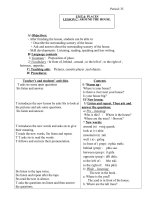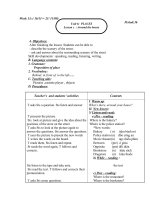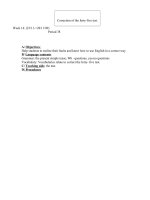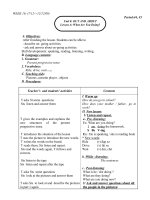37 Bài giảng tiếng anh khách sạn FOR STUDENT
Bạn đang xem bản rút gọn của tài liệu. Xem và tải ngay bản đầy đủ của tài liệu tại đây (4.18 MB, 46 trang )
MINISTRY OF CULTURE, SPORTS AND TOURISM
DANANG VOCATIONAL TOURISM COLLEGE
ENGLISH FOR HOTEL
MANAGEMENT 3
(ENGLISH FOR RESTAURANT)
Danang, 2015
STARTER
2
3
4
5
WRITING
A letter of job planning
Imagine you are a supervisor of a restaurant. Write a plan to your manager
describing jobs of the staff (job, working section and duties).
6
STARTER
Look at the picture and discuss the questions.
What do you see in the picture?
What are they doing?
VOCABUARY: The tableware
The table linen
7
Table cloth
Slip cloth
Napkin
Service cloth
Side plate
Soup bowl
Rice bowl
Crockery
Dinner plate
Cutlery
Knife
Fork
Spoon
Tea spoon
Soup
spoon
Fish knife
Fish fork
Butter knife
Dessert
knife/fork
Silver
cutlery
Glassware
Wine glass
Water glass
Beer mug
Decanter
Jug
Cruet
8
Salt and pepper
pot
Oil bottle
Oil bottle
Coaster
The prepositions of place
Match the words in the box to the pictures. Then practice saying the words.
Next to
Under
1.
……………
…
In the middle of
In
On the right of
3.
…………
……
2.
…………
……
5.
…………
LANGUAGE STUDY
……
Prepositions of place
6.
…………
……
On the left of
On
4.
…………
……
7.
…………
……
We use preposition of places to describe how to set tables.
- Put (tableware) in the middle/ center of………….
- Place (tableware) to the left / right / top / bottom of………….
- (tableware) goes to the left/right/top of………..
- (tableware) is facing in/out…………...
- (tableware) is put above/ below………….
Examples:
Place dinner knife to the right of the napkin.
Make sure the blade is facing in.
The soup spoon should go to the right of the dinner knife.
9
The water goblet is put above the knife.
PRACTICE
Look at the picture of table set for buffet breakfast. Then complete the
sentences below.
1. Put the napkin in the center of the guest’s seat.
2. Place the dessert knife………………………………..
3. Put the spoon…………………………………
4…………………………………………………
LANGUAGE STUDY
Sequence adverbs
We use sequence adverbs to describe the setting procedure
First/ first of all/ second/ third/ then/ next/ after/ after that/ finally…….
Example:
- First, put the show plate on the table in the center of guest’s seat
- Next, put the folded napkin on the plate
- Then, place the dinner knife on the right of the show plate.
Your turn: Use sequence adverbs to talk about setting table.
First, place the show plate on the table
Second, fold and place the napkin on the plate
Then, …………………………………………
10
After that,……………………………………
Finally place the salt and pepper pot in the middle and check.
LISTENING
1. Listen and match the items in the place setting
napkin
side plate
butter knife
main course knife
main course fork
first course knife
first course fork
soup spoon
wine glass
salt and pepper
fish knife and fork
dessert spoon and fork
2. Listen again and draw the table. Then describe how to set it up in your
words.
SPEAKING
11
PRONUNCIATION
Word stress
1. Listen and repeat.
table
sideboard
discuss
2. Listen. Is the stress on the first or the second syllable?
Napkin
butter
above
Dinner
dessert
salad
Ashtray
decanter
flower
READING
Setting the table
1. Discuss with your partner the process
of setting the table
2. Read the text and write down the tableware
12
3. Answer the questions
a. Where do you go first?
b. Which plates do you get?
c. Where do the knives go?
d. Where do the forks go?
e. Where do the butter-knives go?
f. What do you finish with?
WRITING
Setting up À la carte table
Use “First/ first of all/ second/ third/ then/ next/ after/ after that/ finally…….”
to write a passage describing how to set the À la carte table.
First of all, we put the show plate on…………………………….
13
STARTER
What information do you ask when taking table reservation?
LISTENING:
1. Listen and correct the information in the form.
2. Listen again. What does Jan say to get the information.
3. Listen and complete the following forms.
14
15
Dates
1. Match an item in column A with the corresponding item in column B.
A
B
first
second
third
fourth
fifth
tenth
twelfth
twentieth
twenty first
thirty first
12th
1st
31st
4th
10th
5th
3rd
20th
21st
2nd
2. Look at the dates in A and choose the correct spoken English in B.
A
B
1st October
the twelfth of April/April, the twelfth
10th May
the twenty second of July / July, the twenty second
16th November the fifth of August / August, the fifth
27th March
the thirty first of September/ September, the thirty first
30th June
the first of October / October, the first
4th January
the tenth of May / May, the tenth
23rd February
the sixteenth of November / November, the sixteenth
12th April
the twenty-seventh of March / March, the twenty-
22nd July
seventh
16
5th August
the thirtieth of June / June, the thirtieth
31st September
the fourth of January / January, the fourth
11th December
the twenty third of February/ February, the twenty third
the eleventh of December / December, the eleventh
A reservation form
1. Look up the meaning and pronunciation of these words in your dictionary
contact
occasion
special
number
party
requirement
reservation
date
other
2. Complete the missing words in the following form.
Name: Mr. James Smith
Contact (1) ……………………..: 020 7734 7002
…………… (2) of reservation : 15th October
Time of (3)………………………: 5 p.m.
Number in (4)…………………: 4
………………………………….(5) : wife’s birthday
Special (6)………………………: flowers, candles
17
PRONUNCIATION
The sounds /θ/ and /ð /
1. The letter ‘th’ can be pronounced as /θ/ /ð /. Listen to the examples.
a. /θ/ thing birthday
seventh
b. /ð / their these
weather
2. Look at these words. Are the letters ‘th’ pronounced as /θ/ or /ð /?
month
they thought
third
father
health thanks
with
READING
1. Look at the headings. Read the text and match the headings with each
paragraph.
Not All Restaurants Take Reservations
Fairness
Special occasions Higher checks
Planning Ahead
Absent patrons
Changes in party numbers.
Not every restaurant will accept guest reservations. They may decide to stop
taking reservations altogether, or they may have never done it to begin with. This
can cause dismay among some guests, but restaurants usually have their
reasons.
1. __________When a couple or a party wants to enjoy a special occasion such
as an anniversary, holiday or other celebratory event, they want to make sure
they can get a table without waiting too long.
2. __________Some restaurants are so popular that they may require patrons to
make a reservation weeks or even months in advance. To be fair, some
restaurants decide to run a purely first-come, first-served business. Wait times
can be extremely long at places like this, but booking reservations for months in
advance can be even more extreme.
3. __________Customers often make reservations for large parties or special
18
occasions. These parties tend to spend more money at the restaurant, which in
turn increases revenue.
4. __________When the reserving party never shows up, sales suffer from the
lost business. Additionally, filling up the reservation book and holding tables for
the parties may force a restaurant to turn away other sales-generating patrons.
5. __________When restaurants are aware of the reservations for the night, they
may be able to better plan the preparation required to serve them.
This is especially true for large parties, such as reservations being made for 1020 people.
2. Answer the questions.
1. What are the advantages of taking reservations?
2. What are the disadvantages of taking reservations?
3. What do some restaurants do to be fair to customers?
WRITING
A letter of reservation
Write full sentences to make a complete letter of restaurant reservation.
1. I / make a reservation/ six /a dinner that will be held/ your restaurant /December
7th.
2. I /prefer /you seat my party/ the middle of the restaurant.
3. Ensuring that we /neither /close nor / far / the stage.
4. I / enclosed/ a check that /cover /total amount / the six seats.
5. If there /anything else that you need/ please/ not hesitate /give me a call /0145
3333.
6. I look forward to /event and am eagerly anticipating /good food /the good time.
Thank you.
SPEAKING
Pair work
A guest makes a phone call to a restaurant to make a reservation for a party.
He will have 5 guests from Europe making their trip to his country this
weekend. As this is an important business party, he is supposed that the party
will be well arranged.
Work with your partner. Make a conversation between a WAITER and a GUEST
to take booking.
19
20
LISTENING
1. Listen to the conversation. Tick the things Jan does when welcoming guest.
2. Listen again and write the phrase Jan use.
21
SPEAKING
Work in pairs. Role play the conversation between waiter and guest to
welcome guest to the restaurant.
22
LISTENING
Listen and choose the statement are True or False.
23
24
STARTER
3. Add some more drinks to the menu above.
25









